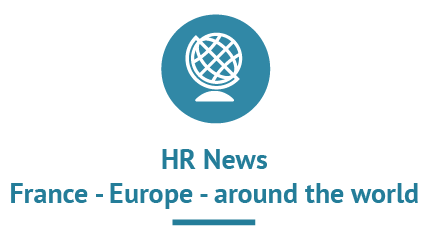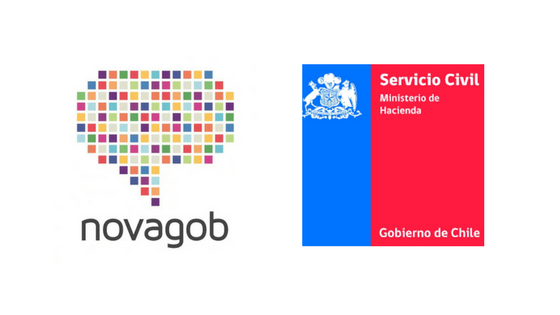|
If you are having trouble viewing this email, open it with your internet browser,
download the PDF version
or contact us.
|
 |
| #37 - September 2021 |
| PDF version - Manage your subscription - Search - Archives |

|
|
vision RH is a newsletter published by the French Directorate General for Administration and the Civil Service (DGAFP). It draws on information sources and reports issued by public administrations, the private sector, international organisations and the press, in several different languages. It aims to provide a broad view of current human resources and civil service initiatives.
|
|

|

|
| Public sector initiatives to better prevent psychosocial risks | |||||
|
Faced with the many changes taking place in the workplace (digital advancements, changing job descriptions, repeated reorganisations), not everyone within an organisation is going to share the same reaction. In today’s civil services, preventing psychosocial risks is central to ensuring a sustainable quality of life at work (1). It is an undertaking that needs to involve all levels of management in order to respond as proactively as possible and ensure at-risk employees are protected. At European level, a comprehensive study was conducted over three years by employers and labour representatives. The project, which was jointly led by France’s Directorate General for Administration and the Civil Service, led to the publication of a guide. It provides an overview of the regulatory environment and proposes an overall strategic approach, presenting collective and individual measures, as well as remedies, which are supported by labour representatives. Employee satisfaction polls can be a useful way to identify some types of trends. But they can’t take the place of a in-depth independent survey. That’s what Portugal did, partnering with its national association of psychologists for assistance preparing the questionnaire and evaluating the responses. In Switzerland, the country’s Federal Council teamed up with the Swiss Insurance Association and the University of Bern to develop a scientifically validated diagnostic tool that provides a detailed overview of workplace stressors. Resources, pressures and state of mind are represented at team, department and organisation levels.A “job stress index” is calculated to evaluate the potential for improvement. Raising awareness through actions that come from the very top is a way to send a strong signal. Luxembourg recently launched Wei geet et? (“How are you doing?”), a multi-media awareness campaign that covers eight topics: conflict, stress, fear, harassment, depression, concerns about a co-worker, addiction and burnout. Denmark’s approach has been to include the topic in management training. Negotiated as part of the most recent collective agreement (OK 18), training sessions are designed to make managers more aware of the issue and provide concrete tools for preventing and managing difficult situations that their colleagues may be experiencing in the workplace. It can be difficult for some people to talk about their personal problems with their manager or with HR. With that in mind, Belgium set up a network of confidential counsellors in addition to its existing prevention counsellors. As a primary point of contact, they provide impartial guidance to employees looking for help, whether that takes the form of a consultation, information or mediation. In Canada, further to a Treasury Board directive, employee assistance programs (EAPs) have been introduced across all federal government departments. Employees can contact their EAP at any time to reach a mental health professional for support, advice or guidance about a difficult situation. These professionals can make referrals if they consider specialised care to be required. New Zealand decided to enforce a zero tolerance policy by defining a set of minimum standards (roles and commitments) that organisations, management and employees need to meet.
|
|||||
|
|||||
|
|
|||||

|
|||||

|

|

|
| United States: a strong commitment to equity and inclusion | |||||
|
The US President issued an executive order on diversity, equity, inclusion and accessibility in the federal workforce. Government agencies and departments will be required to draw up quarterly action plans aimed at removing barriers to equal opportunity across all HR processes. Those in charge must report annually on the status of their efforts. |
|||||
|
|||||
|
|
|||||

|
|||||
| Austria: a new strategy for attracting youth | |||||
|
The Austrian civil service has set itself the challenge of making sure public job postings spark the interest of young applicants. Both the jobs website and the listings themselves will be completely redesigned to highlight areas of interest. And in response to a request, volunteer work will be considered as part of hiring for apprenticeships. |
|||||
|
|||||
|
|
|||||

|
|||||
| United Kingdom: a tool to help plan relocations | |||||
|
The UK Cabinet Office is looking into developing a “geographic capability map” in relation to its plan to relocate around 22,000 civil service jobs out of the Greater London Area as part of the Places for Growth programme. By pooling together data from multiple departments (talent profiles, training capabilities, future site locations), the idea is to form hubs in particular fields to realise economies of scale. « An online tool showing current and future team locations will help departments plan their relocations »
|
|||||
|
|||||
|
|
|||||

|
|||||

|

|
| Italy: new public service job portal | |||||
|
Introduced along with the country’s recovery plan, Italy’s new public service job portal, inPA, will gradually become home to all types of public job postings across the country. Candidates will be able to create an account using their digital ID number (SPiD) and upload their information (education history, qualifications, skills). A partnership with LinkedIn will also make it possible to import CVs. |
|||||
|
|||||
|
|
|||||

|
|||||
| Finland: intensive co-creation learning workshops | |||||
|
HAUS, Finland’s leading training institute, is offering a new format of training called “sprints”. The goal of a sprint is to address a need identified by a team in the space of a week. In co-creation workshops, participants work together to model solutions, with guidance from experts to ensure the deliverable is well thought out and effective. |
|||||
|
|||||
|
|
|||||

|
|||||
| Luxembourg: the 5+1 skills model | |||||
|
Launched alongside a reform to reduce the use of short-term contracts in the public sector, a new fact-checking section is now available on the Spanish government’s website. Structured as an FAQ, it provides clear explanations on topics using concrete examples. According to those who write for it, the idea is to set the record straight on false information that is being spread, an increasingly common problem. « This is a hierarchical model because the skills are interrelated and evolve from an elementary level to an advanced level »
|
|||||
|
|||||
|
|
|||||

|
|||||

|

|
| France: consultations on the reform of the senior civil service | |||||
|
Presented at a management meeting held on 13 July, a public consultation was conducted to get feedback from senior civil servants on reforms underway that concern them directly. The takeaways: although the senior civil service promises the potential for an interesting and diverse career path, there is a lack of individualised opportunities, due to a silo mentality, a lack of flexibility and other shortcomings. |
|||||
|
|||||
|
|
|||||

|
|||||
| Spain: tackling disinformation with #ConLupa | |||||
|
Launched alongside a reform to reduce the use of short-term contracts in the public sector, a new fact-checking section is now available on the Spanish government’s website. Structured as an FAQ, it provides clear explanations on topics using concrete examples. According to those who write for it, the idea is to set the record straight on false information that is being spread, an increasingly common problem. |
|||||
|
|||||
|
|
|||||

|
|||||
| Belgium: “right to disconnect” extended to all civil servants | |||||
|
According to a draft royal decree, Belgium will soon see a new article added to its civil service act, guaranteeing public employees the right to disconnect. The decree will considerably extend the scope of the measure: all aspects relating to working time, personal time and care are considered in an integrated manner, and it will apply to all employees, whether or not they work from home. « The decree provides for the possibility of regular consultation within each organization on all aspects of disconnection »
|
|||||
|
|||||
|
|
|||||

|
|||||

|

|
| OECD: Government at a Glance 2021 | |||||
|
Every two years, the Organisation for Economic Co-operation and Development (OECD) publishes its Government at a Glance report. One of the main conclusions of the most recent edition is a move toward diversity in public employment. In 2020, targets were used by 24 out of 33 OECD countries to employ people with disabilities (vs 12 in 2016). In contrast, only 14 out of 33 OECD countries had targets for gender balance (vs 9 in 2016). |
|||||
|
|||||
|
|
|||||

|
|||||
| Germany: labour agreement on digital transformation | |||||
|
Unions and government signed an agreement on the digital transformation and its impacts on employment. The agreement guarantees job protection and includes a graduated procedure for adapting to changes, with measures up to and including career retraining. Public employees who are required to make a permanent move will also be entitled to a mobility payment, based on distance. |
|||||
|
|||||
|
|
|||||

|
|||||
| France: a five-year plan on workplace health | |||||
|
Structured around five main components and 14 operational objectives, the new “workplace health” plan presented by the Directorate General for Administration and the Civil Service to employee and employer representatives contains 37 measures. Some of these include trialling specific studies, introducing new training, making instructional resources and tools available, and developing initiatives to promote employee health. « This plan lays the foundations for a new system taking into account the statutory particularities and work constraints »
.
|
|||||
|
|||||
|
|
|||||

|
|||||

|

|
| At Michelin, job mobility is a family affair | |||||
|
Accepting a transfer or promotion, especially if it involves a relocation, is always going to have an impact on an employee’s family life. For those with a partner, their job situation will also factor into the equation. At tire manufacturer Michelin, which has operations in 18 countries, employees get personalised guidance to promote career opportunities across its various sites (1). Recognising that it benefits no one for a couple to prioritise one partner’s career over the other, the company introduced support measures for the partners of its employees. To help couples find a new place to live, the company offers three or six days of leave (depending on how far away the move is) as well guidance from a financial advisor. Hiring priority is given to interested partners who are qualified for open positions. The company also offers to conduct a skills assessment and to get involved in their job search. In addition to working with job centres and recruitment agencies, it has hiring partnerships with a dozen or so large companies. The initiative has already produced positive results. To date, the placement rate for employees’ partners (those transitioning from a permanent position, a contract position of 6 months or more, or a long-term training programme) is 90%.
|
|||||
|
|||||
|
|
|||||

|
|||||

|

|
| Giving more visibility to workplace best practices in Chile’s civil service | |||||
|
Since the start of the pandemic, workplaces have had to keep adapting to new organisational challenges – which have sometimes proven to be unique opportunities to think outside the box[KC1] and shake up the status quo. That includes government employers, which have also played a part in this major shift, issuing advisories and recommendations to their departments and publishing guides and manuals. Taking it a step further, Chile decided to collect all the resources developed by experts across the civil service under the hashtag #CuidemonosEntreTodos (1), building a bank of workplace best practices from across the OECD country. The objective was twofold: to shine a light on often low-profile initiatives and to share the details of real success stories in context. .
The aim is to instil a sense of friendly competition between different professions, sectors and branches of the civil service that may be facing similar problems. It’s an initiative that had previously been promoted to government departments in a presidential memo. Within each ministry and in local governments, committees are tasked with going out in search of best practices. To make the list, which is broken down into eight categories, initiatives have to be innovative and reproducible. A contact person, someone with expertise on the subject, is also designated for each project in order to answer any questions or provide assistance. The idea behind the best practices, which focus on the work environment and workplace relations, is that they should help improve, simplify and streamline day-to-day work without formalising any new rules, particularly at key employee milestones such as onboarding and integration, professional development, promotions or job changes, and retirement. Special attention is given to initiatives that improve the image of the civil service as an attractive place to work. In addition to contributing to a code of best practices included in the HR library, the bank has sparked interesting discussions and led to the creation of numerous multidisciplinary networks dedicated to the topic. And because the initiative was designed to be collaborative above all else, employee associations are consulted at various steps of the process to provide their feedback.
|
|||||
|
|||||
|
|
|||||

|
|||||

|
|
Share
|
||||
|
||||
| SUBSCRIBE - UPDATE YOUR SUBSCRIPTION - ARCHIVES - RSS - UNSUBSCRIBE |
|
French Directorate-General for Administration and the Civil Service (DGAFP)
Publication Manager: Nathalie COLIN Managing Editor: Nathalie GREEN Editor-in-chief and Autor: Jean-François ADRIAN Layout and graphic design: Jean-François ADRIAN and Aphania. The texts of the publication do not reflect the point of view of the DGAFP
In accordance to the French Act n°78-17 of 6 January 1978 on information technology, data files and civil liberties and to the european General Data Protection Regulation (GDPR), your personal data is stored securely and you are entitled to access, correct and delete them. To do so, you should send an e-mail to (contact-visionrh@kiosque.bercy.gouv.fr) or write to DGAFP: 139, rue de Bercy - 75012 Paris; France.
The links to a machine translation are accessible with the only Chrome browser Reproduction is authorized with mention of the source © DGAFP 2021 / N° ISSN: 2606-7528. |
|
|






